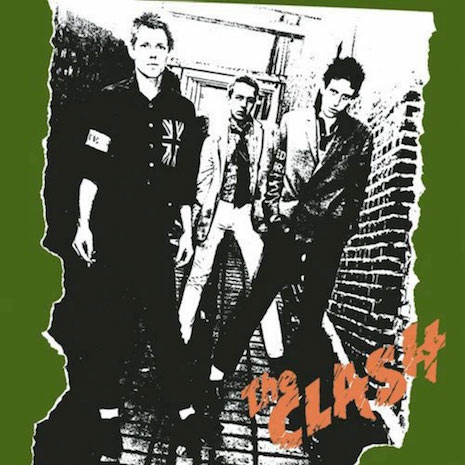
Last year Paul Dougherty posted this treasure on his blog When p**k was a work in progress, where it then went unaccountably ignored. The setup is that in 1977, as a punk fan annoyed that the Clash’s first (and, at that point, only) album hadn’t yet found distribution in the United States, Dougherty wrote Epic Records a letter to express his annoyance. Remarkably, Epic wrote back—and the letter Dougherty received is a fascinating document of a tumultuous moment in the history of rock music.
Bruce Harris was the name of the thoughtful A&R representative from Epic Records, and his letter is a nearly perfect blend of punk idolatry and corporate wariness. Harris has appeared on DM before—he was the executive who signed the Nails in 1984, and as it happens, that band’s lead singer and main songwriter, Marc Campbell, has been one of the most stimulating Dangerous Minds contributors for many years. In 2011 Campbell wrote about the perils for musicians of getting involved in the music business, noting in a postscript that “My experience at RCA would have been far worse had it not been for the comradeship of two people who did love rock and roll: Bruce Harris (R.I.P.) and Gregg Geller.”
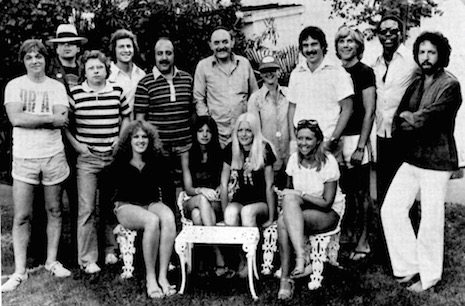
Epic Records A&R team, 1979. Bruce Harris is at left, wearing the hat. (As is true for most of the images on this page, click the picture to see a larger version.)
What’s fascinating about Harris’ letter to Dougherty, which is dated November 29, 1977, is that it shows a true appreciation of the singular talents of the Clash while also recognizing the limitations that would hold the band back, primarily the shoddy production of the first album compared to the Sex Pistols’ Never Mind the Bollocks. I don’t think anyone is crazy about the production on that album—Allmusic, in a 5-star review, treats the “poor sound quality” as an asset, and Robert Christgau, in the middle of calling the album his new favorite punk LP from the U.K., noted at the time that it was “apparently tuneless and notoriously underproduced.”
One gainsays Harris’ expertise in handicapping the likely future success of bands in the American marketplace at one’s peril, but what’s hilarious about his missive is the extent to which he may have gotten it wrong. When he lists a bunch of bands that he loves but can’t sell in the U.S., consisting entirely of Blondie, the Clash, the Adverts, and the Vibrators, that list (and the mindset willing to back it) would instantly have made Harris the greatest A&R man of the era. Harris wasn’t in the business of distributing records that would still be viable assets in the year 2000, although ... he kind of was.
Harris wanted to usher in the new era of punk the “right” way, and that and his cautious responsibility to safeguard Epic’s assets may have caused him to miss an opportunity. The under- or non-produced quality of the Clash’s first album, after all, is precisely what Allmusic and Christgau liked so much about it, and that’s a perspective we in the year 2015 share—it’s Harris’ concern to keep the “Fleetwood Mac” quotient low on the Clash’s second album that seems dated to us. When Harris calls the move of championing imperfect production as aesthetically valid as “a genuine copout,” he’s missing the impulse that led to musical movements as disparate as grunge, lo-fi, hardcore, and crunk. Of course the Clash and the Vibrators and so forth had the better of that argument, in the long run. That doesn’t magically remove the obstacles Harris would have faced in selling the Clash to Iowa, but it does generate some pretty profound ironies.
OK—enough of my yakkin’. Here’s the letter, transcription is below.
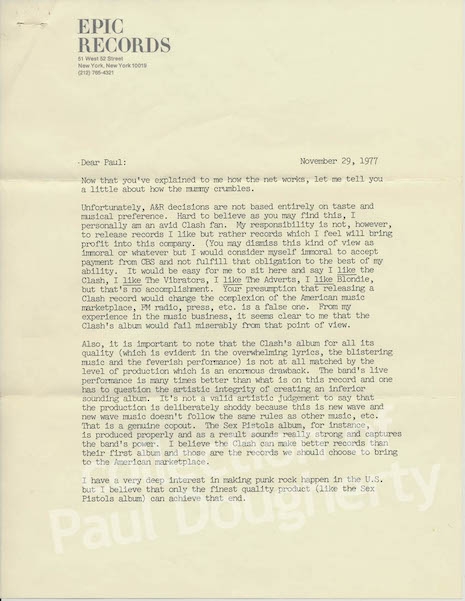
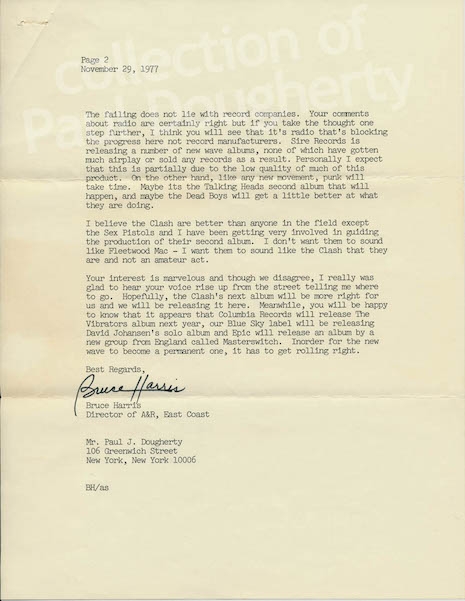
This was written in late 1977. The Clash’s first album, of course, was released in the U.K. in 1977 by CBS, and it wouldn’t get a U.S. release until two years later, by Bruce Harris’ employer, Epic. CBS and Epic released Give ‘Em Enough Rope as well as all of the Clash’s remaining studio albums in the U.S., so he was right to guess that “the Clash’s next album will be more right for us and we will be releasing it here.”
Here’s a list of the Epic Records roster in 1979, with the Clash included:
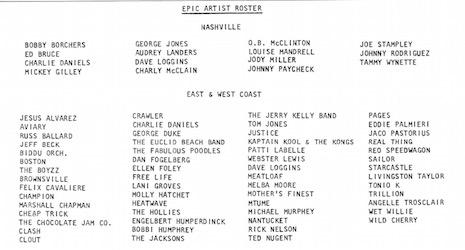
The Vibrators’ first album, Pure Mania, received a U.S. release by Columbia in 1977, but given the date of this letter, it’s not likely that a vague reference to “next year” refers to that; either the album was already out or he knew its release date perfectly well. Meanwhile, neither Epic nor CBS had anything to do with the U.S. release of the Vibrators’ second album, V2.
Harris was quite right about Blue Sky releasing Johansen’s first album, and nobody gives a flying fuck about Masterswitch. (Okay, okay: According to Discogs, Epic did put out one single solitary 7-inch in 1978.) He was also astute in surmising that Talking Heads would be arguably new wave’s greatest crossover success.
November 29, 1977
Dear Paul:
Now that you’ve explained to me how the net works, let me tell you a little about how the mummy crumbles.
Unfortunately, A&R decisions are not based entirely on taste and musical preference. Hard to believe as you may find this, I personally am an avid Clash fan. My responsibility is not, however, to release records I like but rather records which I feel will bring profit into this company. (You may dismiss this kind of view as immoral or whatever but I would consider myself immoral to accept payment from CBS and not fulfill that obligation to the best of my ability. It would be easy for me to sit here and say I like the Clash, I like the Vibrators, I like the Adverts, I like Blondie, but that’s no accomplishment. Your presumption that releasing a Clash record would change the complexion of the American music marketplace, FM radio, press, etc. is a false one. From my experience in the music business, it seems clear to me that the Clash’s album would fail miserably from that point of view.
Also, it is important to note that the Clash’s album for all its quality (which is evident in the overwhelming lyrics, the blistering music and the feverish performance) is not at all matched by the level of production which is an enormous drawback. The band’s live performance is many times better than what is on this record and one has to question the artistic integrity of creating an inferior sounding album. It’s not a valid artistic judgement to say that the production is deliberately shoddy because this is new wave and new wave music doesn’t follow the same rules as other music, etc. This is a genuine copout. The Sex Pistols album, for instance, is produced properly and as a result sounds really strong and captures the band’s power. I believe the Clash can make better records than their first album and those are the records we should choose to bring to the American marketplace.
I have a very deep interest in making punk rock happen in the U.S. but I believe that only the finest quality product (like the Sex Pistols album) can achieve that end.
The failing does not lie with record companies. Your comments about radio are certainly right but if you take the thought one step further, I think you will see that it’s radio that’s blocking the progress here not record manufacturers. Sire Records is releasing a number of new wave albums, none of which have gotten much airplay or sold any records as a result. Personally I expect that this is partially due to the low quality of much of this product. On the other hand, like any new movement, punk will take time. Maybe its the Talking Heads second album that will happen, and maybe the Dead Boys will get a little better at what they are doing.
I believe the Clash are better than anyone in the field except the Sex Pistols and I have been very involved in guiding the production of their second album. I don’t want them to sound like Fleetwood Mac—I want them to sound like the Clash that they are and not an amateur act.
Your interest is marvelous and though we disagree, I really was glad to hear your voice rise up from the street telling me where to go. Hopefully, the Clash’s next album will be more right for us and we will be releasing it here. Meanwhile, you will be happy to know that it appears that Columbia Records will release the Vibrators album next year, our Blue Sky label will be releasing David Johansen’s solo album and Epic will release an album by a new group from England called Masterswitch. Inorder for the new wave to become a permanent one, it has to get rolling right.
Best regards,
Bruce Harris
The source for the internal Epic Records images (not including the letter) is this marvelous PDF file.
Thank you Annie Zaleski!